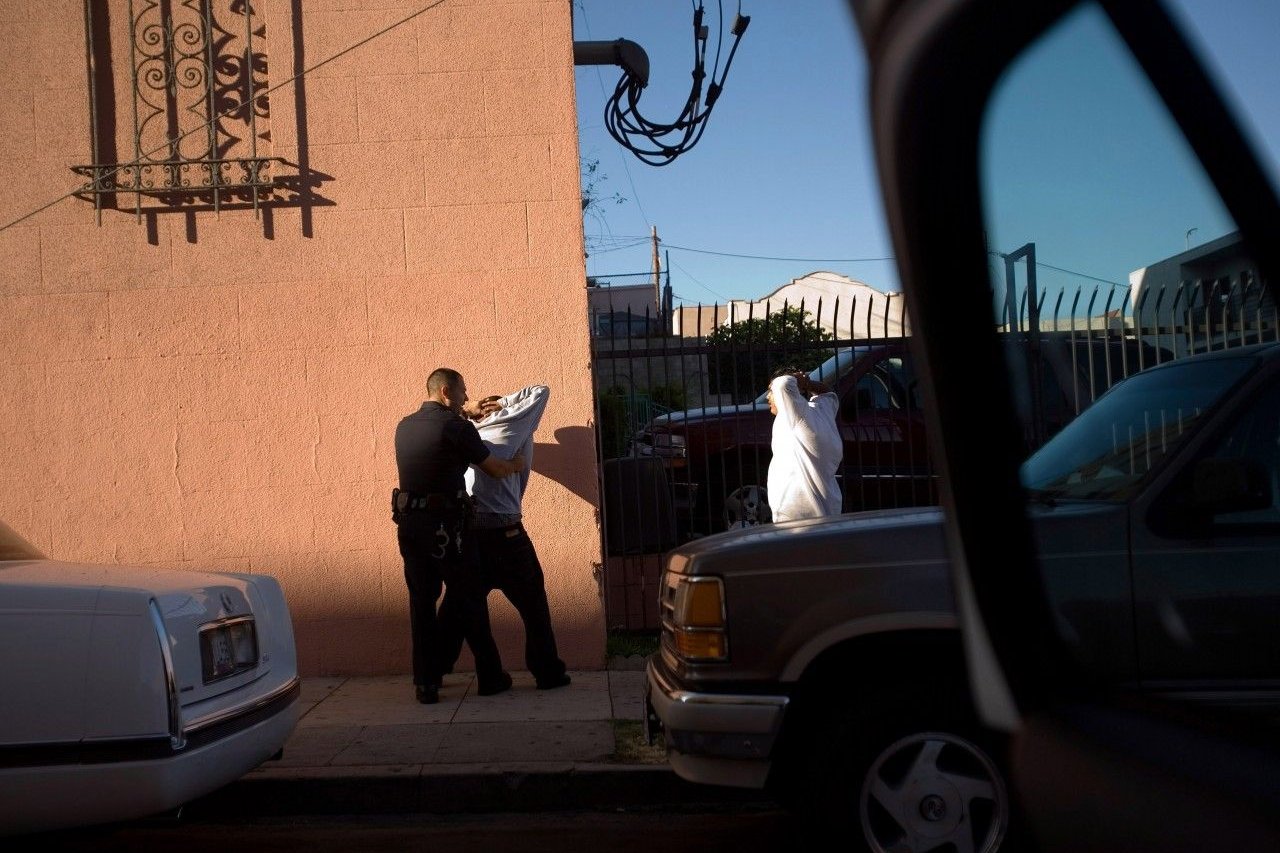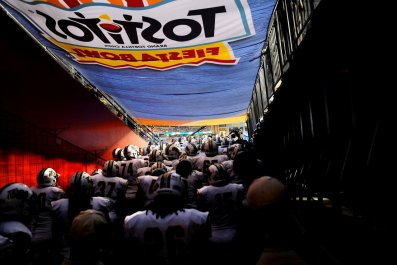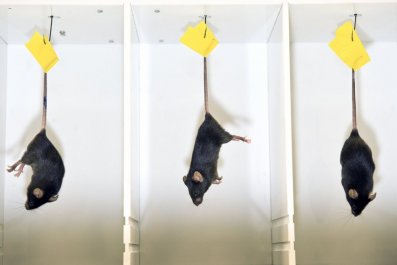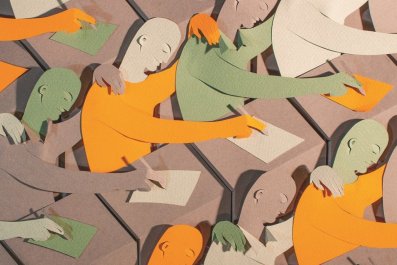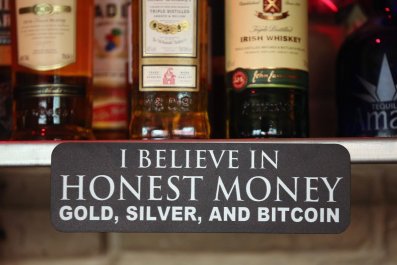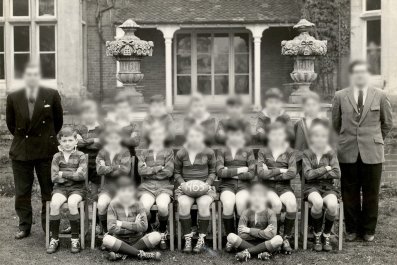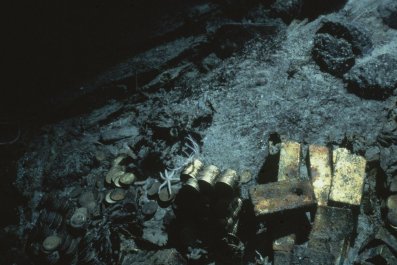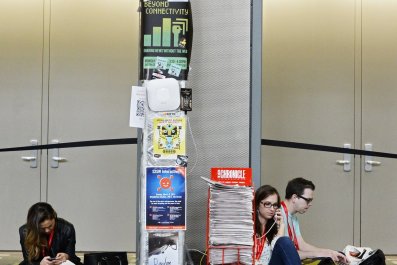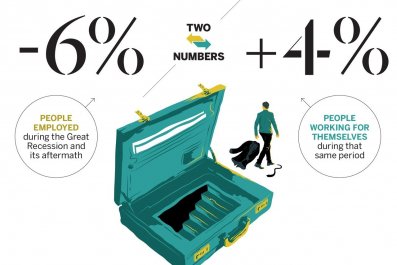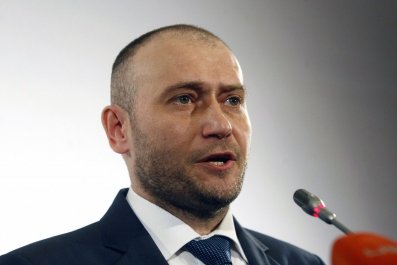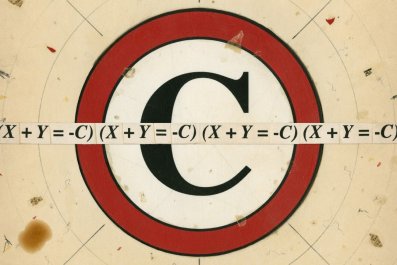On the evening of April 23, 1968, Richard Jenks, a D.C. police officer, pulled over and arrested Willie Robinson for driving on a fraudulent permit. As Jenks patted Robinson down, the patrolman noticed a crumpled up cigarette pack in his coat pocket. "I could feel objects in the package," he would later testify, but "I knew they weren't cigarettes." His intuition was right. They were 14 gelatin capsules filled with heroin. As any viewer of TV police procedurals knows, a police officer needs a warrant to execute a search. Jenks didn't have one, but, as the Supreme Court would rule, he didn't need one because Robinson was under arrest at the time.
More than 40 years later, on August 22, 2009, Charles Dunnigan, a patrol officer in San Diego, pulled over a Lexus with expired tags in the city's Lincoln Park neighborhood. Like Robinson, the driver—a local college student named David Riley—was driving with an invalid license. In the process of impounding his car, Dunnigan and another officer discovered, hidden under the hood and stuffed into gym socks, a .40-caliber Glock and .45-caliber Springfield pistol.
Dunnigan arrested Riley for illegal gun possession and, like Jenks, searched him and his effects, one of which was a Samsung smartphone. In two warrantless searches—one by Dunnigan at the scene and one by a gang detective at the police station hours later—police scrolled through Riley's contacts list, text messages, photographs and videos. Prosecutors used evidence taken from those searches to charge Riley in an unsolved gangland shooting that had taken place three weeks earlier. Riley, they claimed, was not just a local college student, but also a member of the Lincoln Park Bloods responsible for a brazen daytime shooting. He was convicted of attempted murder and related charges and was sentenced to 15 years to life prison.
This tale of two searches raises a question: When it comes to privacy, should the law treat a cell phone the same way it treats a crumpled pack of cigarettes? This April, the U.S. Supreme Court will weigh in on that question for the first time when it hears arguments over whether the searches of Riley's smartphone were legal. (The court will also hear a companion case involving the search of a flip phone in a Massachusetts drug case.) What the justices decide will have wide-ranging implications for both privacy and law enforcement. Moreover, court observers say, it may signify an early effort by the justices to update old privacy doctrines in light of new technology at a time when privacy and technology—thanks to the disclosure of widespread surveillance by the National Security Agency—are at the forefront of the public consciousness.
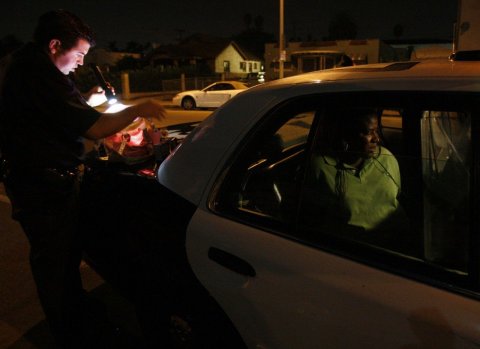
The Fourth Amendment to the U.S. Constitution requires police to obtain a warrant from a judge before executing a search. When police violate that amendment, the results of the illegal search can't be used to prosecute the person whose privacy rights the police infringed on. Nor may prosecutors use evidence later discovered because of the search—evidence dubbed, in a metaphor uncommonly colorful for the law, "fruit of the poisonous tree."
But like most bright-line legal rules, the warrant requirement is checkered with exceptions. The one that let Jenks search Robinson's pack of cigarettes is called the "search incident to arrest" doctrine. The doctrine holds, in the words of leading Fourth Amendment scholar and George Washington University law professor Orin Kerr, that "'a full search of the person' is always permitted at the time of a lawful arrest." It grows out of two concerns. First, police need to ensure that suspects aren't armed. Second, waiting to get a warrant risks a suspect destroying evidence. (Think of a desperate cartoon character cramming an incriminating note into his mouth.)
Legally, not much has changed since the court decided United States v. Robinson in 1973. The same can't be said for the world outside the law books. "In 1973," Kerr has written, "a search of a person incident to arrest might include...a search through a person's pockets. Those pockets might contain keys, a wallet, cigarettes, or a small amount of narcotics." Today, those pockets almost inevitably contain a cell phone. More than half of those cell phones are smartphones, which Kerr calls "multifunctional computers that just happen to have telephone capabilities."
For privacy advocates, the rise of smartphones has fundamentally remolded the search incident to arrest doctrine, lending it an Orwellian cast. Without a warrant, they note, even the NSA can only collect so-called metadata—what number you've called, when, and for how long—not the contents of your phone calls, text messages and emails. But in most states, any law-enforcement official, from a beat cop to an FBI agent, can browse through your smartphone without a warrant so long as there's a reason to arrest you. "Every time the police pull someone over for failing to wear a seat belt or riding a bike without a helmet or for a DUI, that categorically allows police to fully inspect the contents—and even download the contents—of your cell phone," says Jeffrey Fisher, a Stanford law professor who will argue Riley's case before the Supreme Court. "That's a pretty harrowing prospect." For exactly the same reason, the government has embraced the doctrine in the digital era. As one law-enforcement official told me, a cell phone is a "treasure trove of evidence."
Meanwhile, "the Supreme Court has been avoiding this issue for more than a decade," according to Thomas K. Clancy, a Fourth Amendment expert and law professor at the University of Mississippi. That has left outdated cases like Robinson's to guide police, prosecutors and lower courts. In a 2010 case involving employer searches of workplace pagers, Justice Anthony Kennedy acknowledged the court's caution outright: "The judiciary risks error by elaborating too fully on the Fourth Amendment implications of emerging technology before its role in society has become clear."
But there are rumblings among the justices that it may be time to bring Fourth Amendment jurisprudence into the 21st century. In the 2010 case, Justice Antonin Scalia wrote a separate opinion criticizing Justice Kennedy's cautious approach. "Applying the Fourth Amendment to new technologies may sometimes be difficult, but when it is necessary to decide a case we have no choice," he wrote. Other justices expressed similar sentiments in a case from 2012, United States v. Jones, which involved long-term GPS monitoring of a suspected drug trafficker's car. Justice Sonia Sotomayor wrote, in a concurring opinion, that parts of the court's search and seizure case law are "ill-suited to the digital age." While the majority ruled in favor of the defendant, its reasoning relied on principles of 18th century property law, and a separate concurrence by Justice Samuel Alito and three other justices criticized the majority for failing to write an opinion accounting for rapid technological developments.
These opinions leave Fisher optimistic that the court will rule in favor of his client. The concurring opinions in Jones "give you five justices that have said pretty forthrightly that new technology changes things, that you can't just take precedent from the pre-digital era and apply it woodenly to digital technology," he says.
While nobody doubts that searching a cell phone is a significant invasion of privacy, privacy advocates and the law-enforcement community are divided sharply over the societal costs and benefits of limiting the search incident to arrest doctrine. The privacy side of the debate argues that warrantless searches of cell phones—in particular smartphones—are far too invasive, chill the use of communications technology and leave too much room for abuse. The law-enforcement side counters that restricting such searches will seriously impede them.
"You used to keep your money in a strongbox at home. Your papers were tied with ribbons on your desk. Your banking records and mortgage were kept at your home, as were your photos," says Bronson James, a criminal defense attorney who drafted a brief for the National Association of Criminal Defense Lawyers urging the court to hear Riley's case. "If the police come and raid my home today, all they'll find is laundry and dirty dishes. My financial records are on my phone. I can do my banking on my phone. All my correspondence is on my phone. My medical records go through my phone. All of my family photos are now in iPhoto, stored in the cloud." In one recent "run-of-the mill burglary" case James tried in Oregon, he says, a warrantless search of a cell phone produced "a 6,000-page printout of every email in that phone, every text message on that phone, every photo ever taken—photos of [the defendant's] children and everyday life.... This is not a crumpled up pack of cigarettes."
In Riley's case, Dunnigan—the arresting officer—noticed that words in Riley's contact list and text messages starting with the letter K were immediately preceded by the letter C. For those, like Dunnigan, versed in the arcana of Southern California street gangs, "CK" stood for "Crip Killer"—a synonym for a Blood. At least two hours after the arrest—a time frame California courts still considered "incidental" to Riley's arrest—Duane Malinowski, a gang detective investigating the shooting Riley was later charged with, accessed, in his words, "a lot of stuff" on Riley's smartphone, "looking for evidence." On the phone, he found photographs of Riley flashing gang signs. In one photo, he posed with a man eyewitnesses identified as one of the shooters in front of a red 1982 Oldsmobile Cutlass they identified as the getaway car. The phone also contained videos of street fights, which California prosecutors described as "a common gang initiation" ritual. In the videos, according to court filings, Riley shouts "Get him, Blood!" and other words of encouragement to the raw recruits.
The importance of this evidence to the state's case is a matter of dispute. Attorneys representing California have argued that there was "ample independent evidence" to convict Riley. For instance, ballistics tests showed that the handguns found under the hood of his Lexus had been used to fire at least 20 rounds in the earlier shooting. Cell phone records placed Riley's phone near the scene of the shooting and, half an hour later, near where the getaway car was hidden.
On the other hand, eyewitnesses to the shooting couldn't positively identify Riley. Two of those witnesses identified another man as one of the shooters, Stephon Redford, "a guy in the gang who had regular access to the car" and "matched [Riley's] description on some level," Patrick Ford, one of Riley's attorneys, told me. DNA lifted from one of the guns found in Riley's Lexus and other evidence also implicated Redford, according to defense court filings. (Redford was never charged.) Most significantly, Riley's first trial ended in a hung jury. The state's circumstantial case left some reasonable doubt.
Law-enforcement officials fear exactly what Riley's lawyers hope for—that otherwise valid evidence will be excluded from trial based on a technical error, failing to get a warrant. If that happens, they argue, more dangerous criminals will go free. "It'd be catastrophic from a law-enforcement perspective" to limit the search incident to arrest doctrine, says Mike Lewis, the sheriff of Wicomico County in Maryland, and until recently the president of the Maryland Sheriffs' Association. "It'd take us back 50 years. Everybody knows we live in a very mobile society, and every day people use cell phones to communicate. But every day people also use cell phones to conspire to commit crimes."
Without searches incident to arrest, those conspiracies might go undetected, even if police manage to arrest one conspirator. "In some cases you're going to have enough probable cause to get a warrant without looking at the phone," says Karen Kruger, a board member of the Legal Officers' Section of the International Association of Chiefs of Police and a partner at the law firm Funk & Bolton. "But in other cases, you're not, and [suspects] are going to be able to take the phone and walk away with evidence." As Kevin Boyle, general counsel for the International Union of Police Associations, put it to me, "If there was an opportunity there and it disappears, you'd lose that chance to solve a crime."
Time, lawyers for the state argue in Riley's case, is another factor. In the time it takes to get a warrant, a suspect or his confederates could wipe a phone's memory, destroying evidence. A delay might also mean that police fail to detect ongoing crime. Lewis told me that, during his career, warrantless searches of arrested suspects' cell phones had been "critical" to the detection and interdiction of ongoing drug trafficking crimes along the Interstate 95 corridor.
Riley's attorneys counter that there are less invasive ways to prevent evidence destruction than a warrantless search. Police could secure the phone in a Faraday bag, which—like the lining of a microwave—prevents radio waves from entering or leaving, while they wait to get a warrant. Or they could simply turn off the phone. Privacy advocates also question how common remote wiping is. No law-enforcement officer I spoke to for this story had ever heard of it happening. (Attorneys representing California did not respond to requests for comment, and the San Diego District Attorney's Office, which prosecuted Riley, declined to comment, citing the pending appeal.)
As for delay, police can today obtain search warrants with ease by phone or email, Ford says, which reduces the risk posed by delay. But others call that an overstatement. Even with telephonic warrants, according to Boyle, "if you get it done within an hour, you're doing it pretty quickly. The idea that an officer is standing out next to a car he just pulled over and quickly getting a warrant to search the phone—it's not going to be done that quickly."
To privacy advocates, these law-enforcement arguments prove too much. "The same argument could be made for searching people's houses or searching people randomly on the street," says Andrew Pincus, a partner at the law firm Mayer Brown who drafted a brief on behalf of two pro-privacy groups urging the court to hear Riley's case. "It's always the case that if the government could do everything it wanted to, it could find more crime. But we'd also be less free."
Hanni Fakhoury, a staff attorney for the Electronic Frontier Foundation, one of the groups for which Pincus drafted the brief, put it another way: "It's like saying criminals use cars to drive to the scene of crimes and therefore we should get permission to search every car. Everybody uses cell phones. We shouldn't penalize people for taking advantage of technological advances."
To be sure, only people who are arrested are affected by the search incident to arrest doctrine. But the Supreme Court has said, Fakhoury and others pointed out, that police can arrest a person for a violation in any crime, no matter how minor. In addition, the court has said that it's perfectly legal to stop a car for a minor traffic infraction as a pretext to investigate a more serious crime. Combined, these doctrines, Ford says, provide "a sneaky way for police to go on a fishing expedition, hoping they can bump into something better."
Robinson's attorneys argued just that point in 1973, claiming that Jenks, the patrolman, was aware of Robinson's prior drug convictions and had used the fraudulent permit as an excuse to search him for drugs. There's no evidence Dunnigan knew Riley was under suspicion in the earlier shooting. Nor is there any suggestion that Malinowski, the gang detective, encouraged officers to stop Riley. Malinowski had begun to suspect Riley was involved the day after the shooting, when witnesses identified the red Oldsmobile Cutlass, which was registered to Riley, as the getaway car. But without stronger evidence of Riley's involvement, Malinowski had been unable to charge him. It's not hard to imagine, in a different case, that a detective in Malinowski's position might ask officers to look for a reason to pull somebody like Riley over in hopes of finding grounds to arrest him and search his cell phone—the "treasure trove of evidence." Less devious but also less hypothetical, Ford says he can't rule out that Riley's profile—a young black man driving a luxury car in a known gang neighborhood—led to the traffic stop: "What we don't know is, were there four people driving around with expired tags that weren't stopped, and the person who they did stop and search was a guy his age that looked like him in his Lexus?" (Dunnigan testified that he pulled Riley over purely because his tags were expired. The San Diego Police Department did not return calls seeking comment.)
Ford also points to the disproportionate effect on neighborhoods where high police activity means a lot of innocent people find themselves arrested—and find the private life stored on their smartphones invaded—in error. "In my practice, I see it all the time," Ford, who is based in San Diego, tells Newsweek. "Within a gang neighborhood there are young men who make the choice to be in a gang, and there are young men who make the choice to avoid the gang because they think that's the right thing to do. But in police officers' minds, when they stop people, it looks like everybody's a gang member. You will guarantee that innocent people will be swept up in these kinds of searches."
Although the cases currently before the court deal with gun and drug crimes, in other cases, "an arrest can be a ruse for all sorts of other nefarious behavior," Fakhoury says. "At Occupy [Wall Street] protests a lot of people would get arrested but never charged.... All of a sudden, police can go to a protest, arrest people for disorderly conduct, look through their phones to see who's associated with these people—go through pictures, emails, text messages. That creates a real chilling effect on the right to free assembly and expression and speech."
Last year, the American Civil Liberties Union and others filed a lawsuit alleging that police in San Francisco searched the cell phone of a political activist—after arresting him for an act of peaceful civil disobedience—and quoted in a police report text messages relating to the activist's political activity.
Meanwhile, Riley awaits the court's opinion in California's Kern Valley State Prison. He told me in a brief handwritten letter that he is "excited" that the court chose his case as a means to address the search incident to arrest doctrine in the digital era. Riley declined to go into details related to the case, citing the pending appeal. But Ford says that, "going forward, I imagine he will be suspicious of pretextual searches of his phone. I think there's heightened suspicion, now that we live in times where it's possible for the police to search the contents of a cell phone without a warrant. That should give everybody pause."



